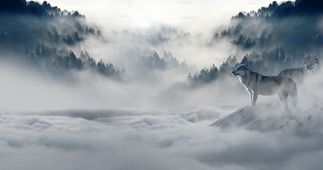Historic climate
There have been many ice ages in the history of the earth. The great periods of icing on earth took place during the Silurian period 439-409 million years ago, between the periods Carboniferous and Permian 290 million years ago and between the periods Paleogene and Quaternary periods 1, 65 million years ago (important to know is that Quaternary the period is still ongoing).
Our last ice age here on earth began a few million years ago and ended about 10,000 years ago. This period is called the Pleistocene Epoch and consisted of many icings. It was very cold during the ice ages, but then the temperature began to increase until 6000-7000 years ago when the temperature suddenly became more unstable and actually dropped during the last millennia.
But the earth's average temperature has nevertheless risen sharply in recent decades, which some scientists believe is due to the increase in carbon dioxide now present in the atomic sphere, which creates a warming effect over the earth's surface instead of, as usual, evaporating into space.
The increase in carbon dioxide, the researchers believe, is the fault of humans who have burned fossil fuels and allowed extreme emissions that have been converted to carbon dioxide and then been taken up by the atmosphere. Researchers call this the global warming effect.
Because there are so many thousands or millions of years between the ice ages, today's earthlings will not have time to relive this time until the drought comes, that is, before the temperature of the earth has risen to degrees that make it uninhabitable on almost the entire surface.
There are places today that are so cold (for example cities in Russian Siberia that have minus 70 degrees or 158 fahrenheit, etc.) so that they would not be significantly affected by a warming but it is still relatively uninhabitable places, but as I said here there is a chance to still live on earth.
Source: SMHI https://www.smhi.se/kunskapsbanken/klimat/istid-1.5961 2019-03-02
Despite the earth's history of ice ages, the earth's lands risk drying up.
How astronomic factors influences climate change
Learn how the arctic ice sheet is effected by the tilt of the earth exposing it to various amounts of sunlight.
